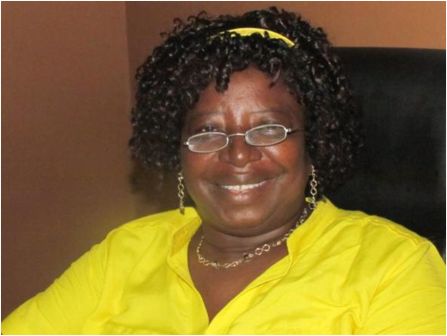Partners in Relief Development Sierra Leone starts second phase of YESP project
Programme Manager for Partners in Relief Development Sierra Leone, (PaRD-SL) Kadie Bernadette Jackson has disclosed in Freetown that they have commenced phase 2 of the Youth Employment Support Programme. (Photo: Programme Manager for Partners in Relief Development Sierra Leone Mrs. Kadie Bernadette Jackson)
She said the programme is supported by the Integrated Administration Unit (IPAU) of the Ministry of Finance and Economic Development, the National Youth Commission and the World Bank.
She said PaRD-SL, led a consortium of three organizations including themselves, Cotton Tree Foundation (CTF) and Christian Community Development Programme (CCDP) to design and implement an integrated programme of employable skills training and provision employment to three thousand (3,000) rural youths in eight districts which included, Koinadugu, Tonkolili, Pujehun, Kailahun, Port Loko, Kambia, Bonthe and Moyamba.
In the first phase of the project, Kadie Bernadette Jackson said PaRD-SL, trained 1,350 beneficiaries from all the eight districts in three different types of trainings, which were done in a participatory manner.
The trainings focused on Literacy& Numeracy, while the other training focused on capacity building in value addition processes such as cassava, rice and oil palm processing and also including packaging and marketing.
She added that training was also done on life issues such as HIV/AIDS, Drug Abuse and Addiction, Gender-Based Violence, Child Abuse, Trafficking and Disability empowerment.
Literacy training focuses on training beneficiaries in numeracy and literacy, book and records-keeping and Entrepreneurship.
The aim of the project, she said, is to address the current unemployment crisis affecting the rural youth population, so as to enable them become entrepreneurs.
The project has generated employment for rural youths in two directions.
Direct employment and self- employment:
On direct employment, three trained beneficiaries have been employed by the Tonkolili Cooperative Union as Rice Mill Operator and Maintenance Officer; the Growth Center Development at Pujehun has also employed one of the trained beneficiaries as production supervisor, while one female trainee had been employed as Training assistant by Tewoh Agricultural Organization in Kailahun.
On self-employment, beneficiaries were put in cooperative of twenty (20) members for accessibility, supervision and coordination. There are sixty-five (65) cooperatives spread across all the eight project districts. Processing facilities have been built in all the districts to enable the cooperative to process their raw materials. The cooperatives have also been with Agricultural Business Centers (ABCs) in their respective chiefdoms to enable the co-operatives use processing facilities at these centers. Besides the processing facilities, the project provides each cooperative with initial packaging materials as well as a working capital to buy raw materials and cover other running costs. The cooperatives convert cassava into the following products: Gari, Foofoo and Rich Cake. Kadie Bernadette Jackson pointed out that Phase two of the project commenced in September and registration is in progress in all the eight districts were the project is being implemented across the country.
She explained that Stakeholders in the districts are consulted on the selection of project beneficiaries as incentives are provided for the youths as a way to motivate the youths during the training.
“Before the project ends in April 2014, we want to see our rural youths contributing to the socio economic development of the country.” Kadie Bernadette Jackson stressed. “We want to see our youths employed so as to improve their standard of living,” She added.
Speaking further about some of the challenges faced during the implementation of the project, she said most of the youths living in major towns do not want to embrace the project as they compare it to the cash for work project and commercial bike riding which they claim gives them more money.
She assured that PaRD–SL is more than prepared to implement the project as they have provided motor-bikes for their field staff to monitor the project implementation.
She commended the World Bank and the Government of SL for supporting the project and appealed for more funds towards the project as there are more than 3000 youths across the country that are vulnerable without any form of skills for employment opportunities. She also encouraged youths to support the project.
Stay with Sierra Express Media, for your trusted place in news!
© 2013, https:. All rights reserved.







